Last Updated on November 5, 2023
The United Kingdom is historically known for tea consumption, so British coffee culture is much less hampered by tradition than it is elsewhere in Europe. This has allowed them to ride current trends and more deftly adapt to a changing landscape, placing them at the forefront of the artisanal coffee revolution in Europe.
Although late to the scene, you can now find independent coffee shops throughout the UK, and there is growing demand for supply chain transparency, consumer education, and the highest quality of both coffee beans and beverage execution.
History of British coffee culture
As in other parts of Europe, cafes in the UK began as gathering places for the intellectual and artistic elites of the 17th and 18th centuries. They were home to social and political discourse that fueled the Enlightenment. The first coffeehouse in England was established in 1650 in Oxford, and would become known as a penny university (the price of a coffee being one penny). These penny universities would continue to pop up around Britain, and serve as clubhouses of a sort for the intellectual elites of the day—mainly upper class white men.
It wasn’t so much about the coffee itself, but about the atmosphere, which was ripe with artistic verve and cultural dissidence. Coffee, unlike alcohol, was seen as a rational beverage, allowing for more serious contemplations and discussions, and allowing business affairs to be conducted in a more civilized manner. But it was really the gathering space that drew patrons in
Eventually, with the domination of tea consumption and the rise in pub culture, coffeehouses and coffee all but disappeared from British culture for nearly two centuries.
Current British coffee culture
The resurgence of cafe culture throughout the UK is rather aligned with its rise in North America, and the current marketplace reflects that. Popular culture of the 1990s—particularly sitcoms like Friends and Seinfeld—depicted the leisurely parsing of daily problems at the local haunt, and coffee shop culture in both North America and the UK experienced a meteoric rise throughout the decade. Chain shops like Starbucks led the charge.
The digital age has only served to intensify the UK’s thirst for a virtual workplace. The pub tends to lower productivity and is itself on the decline, with many Brits opting for a healthier lifestyle that involves less alcohol consumption. Coffee shops have become a haven for intellectuals and professionals who long for a break from the cubicle or home office. Contemporary coffee shops throughout the UK are often filled, much like their North American counterparts, with a sea of latte-sipping, laptop-plucking young professionals.
As pub culture ebbs, many people are instead choosing cafes for social gatherings and special occasions. These well-appointed spots offer more of a full experience. Consumer knowledge is on the rise, and people are increasingly searching out brands that they connect with and are proud to support. Once you’ve got a taste for the subtlety and complexity of small-producer coffee beans, it’s hard to go back to something of lesser quality.
The UK, like North America, has seen a shift in the market toward independent, artisanal shops that offer higher quality beans and beverages, with a focus on sustainability and supply chain transparency. There is also a wonderful sense of community in the British scene, with ideas, recipes, and techniques being shared openly and with enthusiasm. This has allowed the UK to stay on trend and deftly navigate the ever-changing scene, keeping the country at the forefront of current coffee culture.
Cultural contributions
The UK has been more of a coffee culture melting pot, absorbing and articulating a range of cultural influences from its neighbors and those further afield, rather than a well of creation and dissemination. They’ve adopted techniques and recipes from Italy, Scandinavia, America, and of course the widely popular flat white from Australia (or is it New Zealand?). As with much of British culture, British coffee culture is extremely influenced by American popular culture, and cafes throughout the UK very closely resemble those in North America.
That said, the British show a growing obsession and demand for the highest quality beans and beverages. Independent shops are leading the charge in education and innovation. We’ll likely see new trends coming out of the UK in the future, particularly from London where consumer demand is driving the need for a good cup of coffee on every corner.
Etiquette
There are few coffee traditions in Britain, and you can pretty much order whatever you like at any time of day. Much like in North America, you order from the cashier and the barista will make your drink to your exact specifications. Sit and relax, or get your coffee to go and join the herd of commuters that flood the streets of London. The fast-paced lifestyle of Londoners has driven to-go coffee culture to the extreme. This has created concern around the associated waste, which is curious in a culture that constantly pushes for a more responsible and sustainable coffee supply chain.
Coffee shops, particularly throughout London, are responding to the intensification of to-go culture by encouraging customers to stick around and enjoy a more robust experience, with educational programming and demonstrations. If you want to learn more about where your coffee comes from, or the latest brewing method, you’ll have no trouble finding a cool artisanal cafe that offers in-depth education and training. With knowledge being openly shared and a culture that’s always looking to the future, you can be sure that the UK coffee scene is hip to the latest trends and eager to pass that on to the consumer.
What to order
The wide range of drinks throughout the UK includes all the classics, but you can also order a super specific drink with all the bells, whistles and modifications, if that’s what floats your boat. The influence of Italian culture is strong, so espresso is still a crowd favorite, with lattes and cappuccinos falling closely behind. But it’s the Antipodean flat white that has taken the market by storm and is now considered a UK staple.
A flat white, contentiously from either Australia or New Zealand, was fittingly introduced to London by a trio hailing from both countries. Peter Hall, James Gurnsey, and Cameron McClure opened their shop Flat White in Soho in 2005, in an attempt to bring the more artisanal style of coffee that was widely popular in their home countries to the UK market.

A flat white is essentially a shorter, stronger latte, but what really sets it apart is the texture and integration of the milk which creates a silky foam and more “flat” appearance. It might sound simple, but making an excellent flat white takes a lot of skill and its rise in popularity is a perfect reflection of the rise of refined and thoughtful coffee culture throughout the UK.
Final thoughts
The Brits may not have held their coffee culture as tightly as other parts of Europe, but their sense of community and their openness to modern trends has allowed them to ride the current rise of boutique coffee culture and remain increasingly relevant in a rapidly evolving industry.
Coffee shops in the UK might not have the same history or romance as those in France or Italy, but they hold their own values of transparency and sustainability and you won’t have to sacrifice quality to find a cafe brimming with charm.
Image at top: © Tony Monblat | Creative Commons


